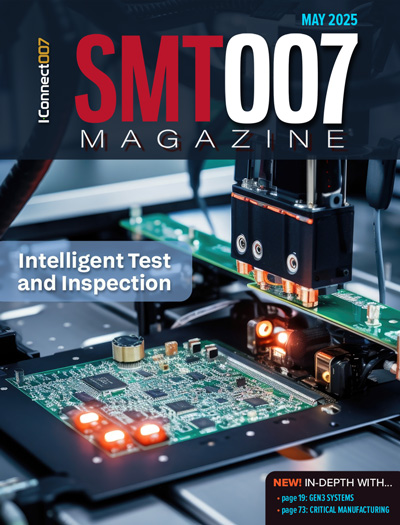-

- News
- Books
Featured Books
- smt007 Magazine
Latest Issues
Current Issue
What's Your Sweet Spot?
Are you in a niche that’s growing or shrinking? Is it time to reassess and refocus? We spotlight companies thriving by redefining or reinforcing their niche. What are their insights?

Moving Forward With Confidence
In this issue, we focus on sales and quoting, workforce training, new IPC leadership in the U.S. and Canada, the effects of tariffs, CFX standards, and much more—all designed to provide perspective as you move through the cloud bank of today's shifting economic market.

Intelligent Test and Inspection
Are you ready to explore the cutting-edge advancements shaping the electronics manufacturing industry? The May 2025 issue of SMT007 Magazine is packed with insights, innovations, and expert perspectives that you won’t want to miss.
- Articles
- Columns
- Links
- Media kit
||| MENU - smt007 Magazine
EU Should Support Other Segments of the Electronics Industry That Complement Chips, New Report Says
July 7, 2023 | IPCEstimated reading time: 2 minutes
Key segments of the European electronics manufacturing industry face significant challenges and require more support, considering their vital role in Europe’s strategic autonomy and the “twin transitions” to a greener, more digital economy.
That is the major finding of a new report from IPC, the global electronics industry association, which says the recently enacted European Chips Act is a welcome step. But “the near singular focus” on the semiconductor industry “has obscured critically important segments of the electronics ecosystem,” specifically printed circuit boards (PCB) and electronic assembly (EMS), without which semiconductors cannot function, the report says.
Over the last 20 years, the European PCB sector experienced a steep decline, the report says, shrinking from approximately 20-30% of global production to just 2% today. Over this time, the EU has become “highly dependent on China,” which now accounts for some 65% of total EU PCB requirements.
The EMS sector has experienced “solid” average annual growth in recent years, fueled by factory investment by large global companies and also by the growth of the downstream markets the sector serves, including automotive, industrial, aerospace, defense, and healthcare. However, the EU imports roughly 90% of required EMS products and services.
“Revitalizing and growing the PCB and EMS segments is essential to building a robust European electronics manufacturing ecosystem, which in turn is essential to ensuring supply chain resiliency, advancing the twin transitions, and promoting European innovation,” said Sanjay Huprikar, president of European Operations. “It takes all elements in the supply chain—from silicon to systems—to successfully produce the electronics we all depend on in so many ways.”
The European Commission is continuing to examine vulnerabilities in its industrial supply chains. On June 23, the European Commission’s Directorate General for Internal Market, Industry, Entrepreneurship and SMEs (DG GROW) hosted a meeting on electronics assembly and printed circuit board manufacturing with key industry stakeholders, including companies from the renewable energy, aerospace/defense, automotive, and industrial sectors. The structured dialogue was called on the heels of an IPC meeting in April that brought together leaders of government and industry to press for an EU strategy to strengthen silicon-to-systems innovation and manufacturing.
IPC’s data-rich report delves into many aspects of the EU’s PCB and EMS sectors, including:
- Europe’s reliance on the PCB and EMS sectors of other nations, especially China, and its vulnerability to global supply chain disruptions related to trade wars, health crises, and natural disasters;
- Europe’s leadership and opportunities in “embedded systems,” i.e., electronic systems embedded into automotive, industrial, aerospace/defense/security, telecommunications, and health care equipment;
- Changes over time in employment, growth rates, market share, and the number of companies in the European PCB and EMS sectors; and
- Government policy decisions that need to be considered, including investment in research, development, and innovation (R&D&I); incentives to invest in factories of the future; workforce development; and international trade policy.
Additional reports, charts, images, and information are in the report and available at IPC.org; subject matter experts are available for interviews.
Suggested Items
Delta SEA Partner Event 2025 Unites Regional Partners to Embrace a “Future Ready” Vision
07/03/2025 | Delta ElectronicsDelta Electronics (Thailand) Public Company Limited, successfully hosted its Delta SEA Partner Event 2025: Future Ready at Delta Chungli Plant 5, Taiwan on June 10 – 11 , 2025.
Murray Percival Company Welcomes CeTaQ to Its Line Card, Optimizing SMT Processes for PCB Manufacturers
07/03/2025 | Murray Percival CompanyThe Murray Percival Company, a trusted supplier to the Midwest's electronics industry, is pleased to announce that it has added CeTaQ to its line card, a global expert in Surface Mount Technology (SMT) measurement systems.
RBB’s Jeff Schartiger Appointed to SMTA Ohio Board as Technical Advisor
07/03/2025 | RBBRBB, a trusted leader in electronics manufacturing since 1973, is proud to announce that Jeff Schartiger, Operations Manager at RBB, has been appointed to the SMTA Ohio Chapter Board as a Technical Advisor.
The Global Electronics Association Releases IPC-8911: First-Ever Conductive Yarn Standard for E-Textile Application
07/02/2025 | Global Electronics AssociationThe Global Electronics Association announces the release of IPC-8911, Requirements for Conductive Yarns for E-Textiles Applications. This first-of-its-kind global standard establishes a clear framework for classifying, designating, and qualifying conductive yarns—helping to address longstanding challenges in supply chain communication, product testing, and material selection within the growing e-textiles industry.
Eiyu Electronics Launches Pre-Assembled Module Product Line to Simplify Sourcing for Embedded Projects
07/02/2025 | BUSINESS WIREEiyu Electronics Co., Ltd., a Hong Kong-based electronic component trading company, today announced the official launch of its pre-assembled module product line, designed to help engineers and procurement teams save time when sourcing complex modular components.


